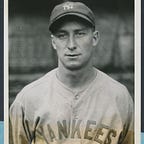Monday, April 25, 1927: New York City
“Lou Gehrig: A Terrible Loneliness”
 Friday we were rained out in Philadelphia. Saturday was also wet, but since the crowds for our Wednesday and Thursday games had set records for attendance in Shibe Park, there was no way the Athletics were going to call off our Saturday game, unless we could actually go swimming on the field.
Friday we were rained out in Philadelphia. Saturday was also wet, but since the crowds for our Wednesday and Thursday games had set records for attendance in Shibe Park, there was no way the Athletics were going to call off our Saturday game, unless we could actually go swimming on the field.
Instead, as frequently happens on rainy days, we sat around the locker room and in the dugout waiting out the rain, bullshitting, playing cards, reading the papers, smoking cigarettes and engaging in conversations that I am sure cause actual damage to our brains.
The loudest of Saturday’s conversations — which was equal parts sweetness and insanity — was a debate between the Babe and Waite Schoolboy Hoyt over whose mother was the better cook. Hoyt, a Brooklyn boy who I’m not sure as a child ever made it home in time for dinner, was of course arguing in favor of his own mother, while the Babe was arguing in favor of Lou Gehrig’s mother.
Ruth loves Gehrig’s mom’s cooking. Both the Babe’s and Lou’s families are of German descent, so he loves the heavy stews Mama Gehrig makes. Since last season, the Babe goes over to dinner at the Washington Heights apartment that Lou shares with his parents, at least once every homestand. Although the Babe will never say it, Mama Gehrig’s cooking means something deeper to him than just a good meal.
The Babe basically grew up an orphan — when he was only seven, his parents had a Baltimore court declare him “incorrigible” (a ruling our manager, Miller Huggins, a former practicing lawyer, would wholeheartedly support) so they could have their out-of-control son legally committed to an orphanage called the St. Mary’s Industrial School. As the story has been told, during the next 12 years that the Babe was at St. Mary’s, members of his family came to visit him only three times, even though the institution is inside the Baltimore city limits. My guess is that for the Babe, having a home-cooked meal at the Gehrigs’ must feel a bit like being adopted.
“Hell, you’ve had her cooking, Duck Eye! And you too, Bingo!” the Babe hollered at me and Benny Bengough, as if he was trying to rally troops into battle. “No offense, Schoolboy,” he bellowed to Hoyt. “But you ain’t never eaten a home-cooked meal until you’ve eaten the food out of Lou’s mom’s kitchen! Ain’t that right, Lou? You tell ’em about the meal she cooked us last week!”
“I think you’re doing a fine job for the both of us, Babe,” was Gehrig’s response.
(To complete the picture: the Babe was standing next to his locker — completely naked, while smoking a cigar butt that a few minutes earlier I caught him picking up off the bathroom floor — and his ample, uncovered backside was less than a foot from Lou’s movie-star handsome face, as Lou was sitting in front of his locker reading one of his Western novels.
It should also be noted that Ruth’s aforementioned backside can bellow as loud as his voice. Most remarkably, Ruth can fart at will. It’s a skill he deploys when he wants to put an exclamation point at the end of a particularly raucous conversation, even with an umpire during an at-bat. Not infrequently, he will explode one just before he exits a room. As Benny Bengough once observed, “Jidge’s ass can only be described as dangerous.”)
It was a classic Ruth and Gehrig moment: the Babe orating with the passion of Teddy Roosevelt standing behind a bully pulpit trying to bust up a trust, and Lou hoping to draw the least amount of attention to himself as possible, even when invited by Ruth to testify in defense of his own mother’s cooking.
It’s a dynamic that during the season plays out multiple times a day, inside and out of the locker room: Ruth always front and center — and always wanting to be front and center — with Gehrig quietly struggling to stay in the wings. Sometimes it’s downright painful to watch.
 This year our train pulled into a small town in Tennessee, after midnight in a pouring rainstorm. The town’s official population is only 1,000 or so, and all of them came out and stood in the downpour waiting for our late-night arrival, just to be able to say they saw Babe Ruth in person. As he does in every town where the train stops, no matter the time of day or night, the Babe came out onto the back platform of the train and gave them much more than a glimpse.
This year our train pulled into a small town in Tennessee, after midnight in a pouring rainstorm. The town’s official population is only 1,000 or so, and all of them came out and stood in the downpour waiting for our late-night arrival, just to be able to say they saw Babe Ruth in person. As he does in every town where the train stops, no matter the time of day or night, the Babe came out onto the back platform of the train and gave them much more than a glimpse.
Wearing his red silk bathrobe and silk pajamas, the Babe, in his booming voice, joked and chatted with the crowd for over 10 minutes, telling them how good it made him feel that they had come out in such awful weather to see him and the rest of the team. And then he asked everyone, “Would you all like to meet my young pal, Lou Gehrig?!!!” Everyone shouted “Yeah!” The Babe stepped back into the train car, put his arm around Lou’s shoulders and said, “Come on, keed, it’s showtime,” and led Gehrig onto the platform.
Unlike Ruth, Gehrig had changed out of his pajamas and put on one of his collegiate white shirts and a pair of khaki pants. Upon being so grandly introduced, Gehrig smiled shyly at the crowd and waved. Ruth acting as the master of ceremonies then loudly pronounced, “Lou, why don’t you say a few words to these fine people.”
Gehrig waved at the crowd again, and then mumbled, “Thanks for coming out to see us.” It was as if he were talking to a few people in an elevator, instead of a crowd of over a thousand standing in a downpour.
Ruth quickly shouted to the crowd, “Lou’s got a sore throat, but he says thanks for coming out folks!” And with that the Babe let Gehrig retreat back to the relative privacy of the train.
Earlier, when the train had first stopped, all of us could hear the crowd cheering as if the town was welcoming back soldiers returning from the Great War. I had sensed that this could be one of those wild Ruthian moments, so I had jumped down from my upper berth bed, put on a sport jacket over my pajamas, and walked to the back car to watch Ruth and the crowd. I stayed in the shadows, just inside the train car door, only a few feet behind Ruth — the same shadows out of which Ruth had pulled Gehrig. I was still standing there when Gehrig came back inside.
As soon as Gehrig re-entered the Pullman car, he had to sit down. His fists were balled up and his jaw was clenched tight. He was breathing hard through his nose. He was frustrated and angry — angry at himself. Then he stood up and walked back to the ballplayers’ car, reached into his sport jacket that was hanging off the side of his berth, grabbed a pack of cigarettes and a lighter and headed to the smoking room.
I walked in after him. Even after I opened one of the windows the smoking room was almost pitch black, so I turned on one of the small reading lamps. “Keep it off,” Gehrig said, curtly.
I did as I was told.
“Thanks,” Gehrig said, by way of apology, I guess.
In the dark I heard the metal scraping sound of his lighter flicking open. The flame appeared for just a second, then was dragged into his cigarette. It acted like a slow flash bulb on a newspaperman’s Speed Graphic camera, briefly illuminating Lou’s face, creating a fleeting portrait of emotional pain.
There were chairs in the smoking room, but Gehrig stood for his whole smoke. As my eyes adjusted to the darkness, I could see him, back against the wall, one hand in his pocket, the other clenching his cigarette. He lifted up his left heel and dropped it back down, again and again, in a nervous, repetitive action that went on for as long as his cigarette lasted. With each dull thud of his heel you could sense the word, “Damn,” repeating inside his head.
Dragging hard on the cigarette, Lou finished his smoke quickly. He tossed the butt out the window of the car, and then headed back to his berth without uttering another word. I stayed inside the smoker thinking about Gehrig.
How could this young man of unlimited talent at the plate, who performs successfully in front of tens of thousands, hundreds of times a year, be so uncomfortable in front of a crowd from a Southern town so small that it doesn’t even have a traffic light?
Now going into our second season as teammates, it’s clear to me that there are only two places where Lou truly feels comfortable: in his apartment with his mother, and inside the batter’s box.
Once inside the batter’s box, it’s as if Lou finally stops thinking, finally stops trying, finally feels at peace — no matter the situation or the pressure of the game.
Last year Huggins moved Gehrig from batting third, in front of Ruth, to batting fourth, behind him. Everyone will tell you this new order stopped the other teams from pitching around Ruth, because Gehrig’s bat is now so threatening at the plate. But I believe Huggins made the change because he knew that it would be a more comfortable spot for Lou. (That’s part of Huggins’s brilliance, he understands the psychological weaknesses of his best players.) After Ruth takes his at-bat, whether he homers or makes an out, the crowd exhales and everyone stops watching the game for a moment and talks about Ruth’s last at-bat. All eyes stay on Ruth, not just when he’s circling the bases after a home run but also when he’s walking back to the dugout after making an out. The fans’ fixation on Ruth allows Gehrig to walk to the plate unnoticed. Knowing that tens of thousands of people are looking at someone else seems to lighten Gehrig’s spirits when he walks to the plate.
Lou Gehrig is the most reluctant hero in baseball. Two years ago, in his rookie year, he finished in the top 25 in the MVP voting. Last year, he finished 10th. Right now, 10 games into his third season he’s hitting .459 with 3 home runs and 19 runs batted in — he might be the most valuable player in the league, outside of Ruth — and all over New York and much of America kids are playing in sandlots and pretending to be Lou Gehrig at the plate. They’re all shouting, “I’m Lou Gehrig!” But they couldn’t be further from the truth. The real Lou Gehrig would never shout his own name, would rather play in an empty stadium if he could, would rather sit in his apartment with his mother than spend a night with a great looking broad.
 There is a terrible loneliness about Gehrig.
There is a terrible loneliness about Gehrig.
Freud, who almost every newspaper and magazine article quotes these days, would have a field day with Gehrig, especially if he ever saw Lou and his mother at a train station. When we leave for our long trips out west, Lou’s mother is always at the station, hugging and kissing him goodbye, as if he were going off to war. And when we arrive back home, his mother is there to meet our train at Pennsylvania Station, often with tears in her eyes. After home games, while the Babe is entertaining the press in the locker room, and then signing autographs for kids at the ballpark gate, Lou is sneaking out a side door, often to go fishing for the evening on the Long Island Sound with his mother.
It’s more important to Gehrig that he make his mother happy than avoid being teased by the players. And three years into his life as a Yankee starter the teasing has let up, at least in terms of ballplayers saying things directly to Gehrig. (Of course, if he were a scrub batting .260, my guess is there would still be plenty of teasing.) But the sight of Gehrig hugging and kissing his mother at the train station remains an uncomfortable spectacle to watch, and genuinely unnerves a few of the guys, leaving them shaking their heads in disbelief, with a touch of disgust.
One of the great joys of being part of a team is, well, being part of a team — being a part of something bigger than yourself. Being one of the guys.
Of course, the truly great players like Ruth and Walter Johnson can never really be just “one of the guys” — their talent and accomplishments set them too far apart. But every now and then they try to fake it, and their teammates fake it back. Hell, it happens all the time with Ruth, who frequently wants to be one of the guys — as long as he can also be “the” guy.
There’s a big part of Gehrig that desperately wants to be one of the guys — and occasionally he’ll try to join in a conversation in the locker room or on a train — but it’s like he speaks a different language from everyone else. He’s like the awkward new kid in school on his first day, when by all rights he should be the king of the prom: He’s got the movie-star looks, a body chiseled out of stone, hand-eye coordination and power that is unmatched by anyone but Ruth, and he has a kind heart. But despite all these natural gifts that make the world want to reach out and touch him, Lou continually retreats into himself and displays an almost complete inability to connect with people.
He’s far beyond just introverted.
One of the great joys of being a ballplayer is the camaraderie and the relationships, both intimate and superficial, that you form with your teammates. I’m hardly a member of the core of the Yankees — heck, I haven’t thrown a pitch off the mound this season — but I still find comfort through my relationships with my teammates. They allow me to fool myself into thinking that I’m not alone in the world.
But Gehrig can neither fool himself nor anybody else.
